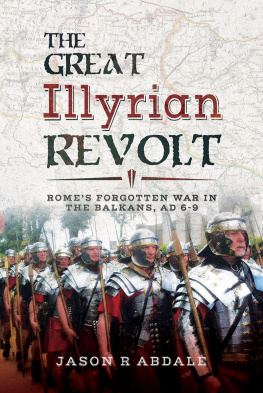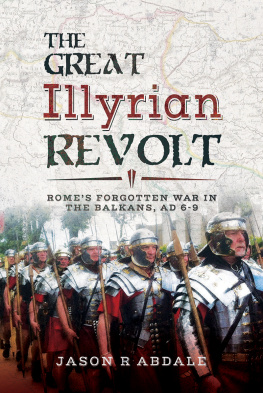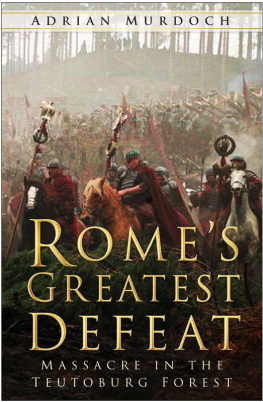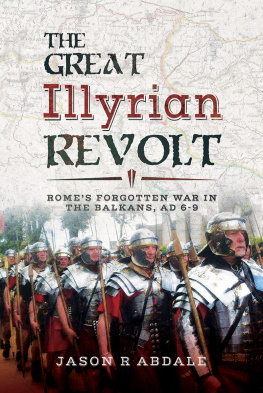First published in the United States by
Trafford Publishing (Bloomington, Indiana) in 2013
First published in Great Britain in 2016 by
Pen & Sword Military
an imprint of
Pen & Sword Books Ltd
47 Church Street
Barnsley
South Yorkshire
S70 2AS
Copyright Jason R. Abdale 2016
ISBN: 978 1 47386 085 8
PDF ISBN: 978 1 47386 088 9
EPUB ISBN: 978 1 47386 087 2
PRC ISBN: 978 1 47386 086 5
The right of Jason R. Abdale to be identified as the Author of this Work has been asserted by him in accordance with the Copyright, Designs and Patents Act 1988.
A CIP catalogue record for this book is available from the British Library
All rights reserved. No part of this book may be reproduced or transmitted in any form or by any means, electronic or mechanical including photocopying, recording or by any information storage and retrieval system, without permission from the Publisher in writing.
Typeset in Ehrhardt by
Mac Style Ltd, Bridlington, East Yorkshire
Printed and bound in the UK by CPI Group (UK) Ltd,
Croydon, CRO 4YY
Pen & Sword Books Ltd incorporates the imprints of Pen & Sword Archaeology, Atlas, Aviation, Battleground, Discovery, Family History, History, Maritime, Military, Naval, Politics, Railways, Select, Transport, True Crime, and Fiction, Frontline Books, Leo Cooper, Praetorian Press, Seaforth Publishing and Wharncliffe.
For a complete list of Pen & Sword titles please contact
PEN & SWORD BOOKS LIMITED
47 Church Street, Barnsley, South Yorkshire, S70 2AS, England
E-mail:
Website: www.pen-and-sword.co.uk
Contents
List of Plates
List of Maps
Chronology of Events
| 46 BC | Publius Quinctilius Varus is born. |
| 31 BC | The Roman Republic ends and the Roman Empire begins. Gaius Octavianus becomes Romes first emperor. |
| 3128 BC | German raiding parties make forays across the Rhine into Gaul. |
| 27 BC | The last pockets of Celtic anti-Roman resistance are quelled in Gaul. Gaius Octavianus takes the title of Augustus. |
| 1917 BC | Romans extensively fortify the Rhine border, and Roman settlers begin squatting on Germanic territory. |
| 17 BC | Three Germanic tribes declare war on Rome. |
| 16 BC | Arminius is born. Noricum becomes a Roman province. |
| 15 BC | Rhaetia becomes a Roman province. |
| 118 BC | General Drusus Claudius Nero commands the legions in the conquest of Germania. He dies after contracting a disease. |
| 9 BC | Pannonia is conquered and incorporated into the province of Illyricum. |
| 98 BC | Varus is Governor of Africa. |
| 86 BC | After Drusus death, his brother Tiberius commands the legions in Germania. |
| 74 BC | Varus is Governor of Syria. |
| 6 BC-1 AD | Western Germania is under Roman military occupation. Anti-Roman sentiment grows. |
| 14 AD | Germanic tribes revolt, but are quelled by Roman forces. |
| 6 AD | Judea and Moesia become Roman provinces. Revolt erupts within the province of Illyricum. Varus is made Governor of Germania Magna. |
| 7 AD? | Arminius, after serving in the Roman army against the Illyrian rebels, returns to Germania to act as one of Varus advisors. |
| 9 AD | The Great Illyrian Revolt ends. The province of Illyricum is afterwards split in half into Pannonia and Dalmatia (date uncertain). |
| Late September, 9 AD | The Battle of Teutoburg. |
| 1012 AD | General Tiberius Claudius Nero leads a revenge campaign against the Germans. |
| 1317 AD | Tiberius is replaced by his nephew Germanicus, who now leads the revenge campaign. |
| 14 AD | Caesar Augustus dies, and Tiberius becomes the second emperor of Rome. |
| 18 AD | Cappadocia becomes a Roman province. |
| 19 AD | Germanicus dies, possibly poisoned. |
| 21 AD | Arminius is assassinated. |
Introduction
In late September of 9 AD, a four-day long battle raged in what is now northwestern Germany. The military of the Roman Empire, the strongest civilization in Europe, was pitted against the native warriors of the North. After years of being defeated on the battlefield by Romes professionals, the Germanic tribes scored their first great victory on their own soil. In the end, the 17th, 18th, and 19th Legions would be no more. This battle would become an event engraved on the German national consciousness for years to come, and its leader, the heroic Arminius, would be the personification of all that was the wild northern frontier and its spirit of freedom.
I first became aware of this battle when I saw a documentary on the History Channel many years ago called The Lost Legions of Varus . Ever since then, Ive been interested in this battle and the various persons involved in it. Several books have been written on this subject within the past ten years, both historical and fictional, some good and others poor. One thing that is noticeably different about my book in contrast to the others is the mere title. It is sub-titled The Battle of Teutoburg as opposed to the more traditional The Battle of the Teutoburg Forest . I did this to resolve an ongoing debate regarding the correct naming of the battle, stating that I believe the entire area was known as Teutoburg in ancient times, and that this name didnt specifically apply to just the forest or the mountain pass. I explain this viewpoint in more detail in the chapter on the battle itself.
I wrote this book in the summer of 2009, inspired by the fact that the year marked the 2,000th anniversary of the battle. During the course of researching this book, I discovered that the Battle of Teutoburg and the events surrounding it were not isolated. In fact, there were several examples of similar circumstances happening between Rome and the various peoples (especially the Germans) that it was in contact with during the twenty years preceding the battles date the Germans destruction of a Roman military unit and the loss of its eagle, and Romes revenge campaign afterwards; the German ambush and near massacre of a Roman column in the forest; the sudden uprising of a supposedly pacified population and the catching of the Romans completely off guard. The Romans should have anticipated something like this would happen, since it had happened several times in the recent past. Why they failed to take precautions isnt clear. As a result, the Romans lost 10,000 men in a four-day battle.
The first edition of this book was published by Trafford Publishing in May 2013 on my birthday, making it the best birthday present ever. Since then, I have received mostly favorable reviews. One professional historian said that he enjoyed my analysis of Germanic tribal culture, and was also pleased that I mentioned recent discoveries made in the area. I was also happy to see that my book was referenced in several internet articles, which made me feel like I was now a genuine historian. In late 2014, Four Days in September was given a positive review by The US Review of Books, which classified my book as recommended reading a rarely-applied rating, indicating the books worth. During the same time, I was awarded Trafford Publishings Gold Seal of Literary Excellence.














